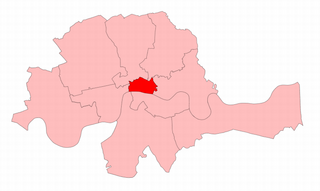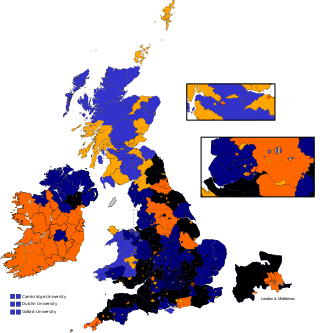Newport was a parliamentary borough located in Newport, which was abolished in for the 1885 general election. It was occasionally referred to by the alternative name of Medina.
Berkshire was a parliamentary constituency in England, represented in the House of Commons of the Parliament of England until 1707, then of the Parliament of Great Britain from 1707 to 1800 and of the Parliament of the United Kingdom from 1801 to 1885. The county returned two knights of the shire until 1832 and three between 1832 and 1885.
Buckinghamshire is a former United Kingdom Parliamentary constituency. It was a constituency of the House of Commons of the Parliament of England then of the Parliament of Great Britain from 1707 to 1800 and of the Parliament of the United Kingdom from 1801 to 1885.

The City of London was a United Kingdom parliamentary constituency. It was a constituency of the House of Commons of the Parliament of England then of the Parliament of Great Britain from 1707 to 1800 and of the Parliament of the United Kingdom from 1801 to 1950.
Wallingford was a parliamentary constituency in England, represented in the House of Commons of the Parliament of England until 1707, then of the Parliament of Great Britain from 1707 to 1800 and of the Parliament of the United Kingdom from 1801 to 1885.
Weymouth and Melcombe Regis was a parliamentary borough in Dorset represented in the English House of Commons, later in that of Great Britain, and finally in the Parliament of the United Kingdom. It was formed by the Union of Weymouth and Melcombe Regis Act 1571 which amalgamated the existing boroughs of Weymouth and Melcombe Regis. Until 1832, the combined borough continued to elect the four Members of Parliament (MPs) to which its constituent parts had previously been entitled; the Great Reform Act reduced its representation to two Members, and the constituency was abolished altogether in 1885, becoming part of the new South Dorset constituency.
Cockermouth was the name of a constituency of the House of Commons of the Parliament of England in 1295, and again from 1641, then of the Parliament of Great Britain from 1707 to 1800 and of the Parliament of the United Kingdom from 1801 to 1918. It was a parliamentary borough represented by two Members of Parliament until 1868, and by one member from 1868 to 1885. The name was then transferred to a county constituency electing one MP from 1885 until 1918.

South Durham, formally the Southern Division of Durham and often referred to as Durham Southern, was a county constituency of the House of Commons of the Parliament of the United Kingdom. It elected two Members of Parliament (MPs) by the bloc vote system of election.
Launceston, also known at some periods as Dunheved, was a parliamentary constituency in Cornwall which returned two Members of Parliament to the British House of Commons from 1295 until 1832, and one member from 1832 until 1918. It was a parliamentary borough until 1885, and a county constituency thereafter.
Andover was the name of a constituency of the House of Commons of the Parliament of England from 1295 to 1307, and again from 1586, then of the Parliament of Great Britain from 1707 to 1800 and of the Parliament of the United Kingdom from 1801 to 1918. It was a parliamentary borough in Hampshire, represented by two Members of Parliament until 1868, and by one member from 1868 to 1885. The name was then transferred to a county constituency electing one MP from 1885 until 1918.
Marlborough was a parliamentary borough centred on the town of Marlborough in Wiltshire, which elected two Members of Parliament (MPs) to the House of Commons from 1295 until 1868, and then one member from 1868 until 1885, when the borough was abolished.
Portsmouth was a borough constituency based upon the borough of Portsmouth in Hampshire. It returned two members of parliament (MPs) to the Parliaments of England, Great Britain and from 1801 the House of Commons of the Parliament of the United Kingdom, elected by the bloc vote system.
Lyme Regis was a parliamentary borough in Dorset, which elected two Members of Parliament (MPs) to the House of Commons from 1295 until 1832, and then one member from 1832 until 1868, when the borough was abolished.
Calne was a parliamentary borough in Wiltshire, which elected two Members of Parliament (MPs) to the House of Commons from 1295 until 1832, and then one member from 1832 until 1885, when the borough was abolished.
Great Marlow, sometimes simply called Marlow, was a parliamentary borough in Buckinghamshire. It elected two Members of Parliament (MPs) to the House of Commons of England between 1301 and 1307, and again from 1624 until 1707, then in the House of Commons of Great Britain from 1707 to 1800 and finally in the House of Commons of the United Kingdom from 1801 to 1868. It elected one member from 1868 until 1885, when the borough was abolished.
Wilton was the name of a parliamentary borough in Wiltshire. It was represented in the House of Commons of the Parliament of England from 1295 to 1707, then in the Parliament of Great Britain from 1707 to 1800 and finally in the House of Commons of the United Kingdom of the Parliament of the United Kingdom from 1801 to 1918. It had two Members of Parliament (MPs) until 1832, but from 1832 to 1885 only one member, as a result of the Reform Act 1832 where it also absorbed the former rotten borough of Old Sarum. In 1885 the borough was abolished, but the name of the constituency was then transferred to a new county constituency electing one Member from 1885 until 1918.
Liskeard was a parliamentary borough in Cornwall, which elected two Members of Parliament (MPs) to the House of Commons from 1295 until 1832, and then one member from 1832 until 1885. The constituency was abolished by the Redistribution of Seats Act 1885.
Lymington was a parliamentary borough in Hampshire, which elected two Members of Parliament (MPs) to the House of Commons from 1584 until 1868, and then one member from 1868 until 1885, when the borough was abolished.
Malmesbury was a parliamentary borough in Wiltshire, which elected two Members of Parliament (MPs) to the House of Commons from 1275 until 1832, and then one member from 1832 until 1885, when the borough was abolished.

South Hampshire was a parliamentary constituency in the county of Hampshire, which returned two Members of Parliament (MPs) to the House of Commons of the Parliament of the United Kingdom, elected by the bloc vote system.

